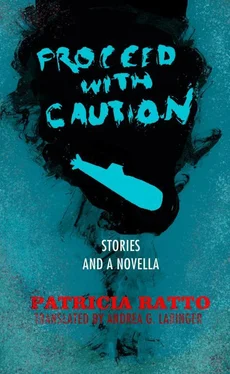Now that the festivities seem to have ended, a uniform murmur reaches me from the bow: some people are praying, maybe because it’s Sunday, maybe because they’re lonely, maybe because they’re afraid. I don’t pray, not even from here, from bed, I don’t know why, but today I can’t, my voice doesn’t work, not even that quiet inner voice people use for praying.
I’ve just climbed into my bunk and see that Polski, standing next to his, is preparing one of those towels they supply us with before we set sail, the ones with a blue anchor printed on them, I suppose to remind us that we’re in the Navy. Today is bath day, though around here bathing is just a figure of speech, an expression whose meaning is quite different from what it means to outsiders. Here water is conserved, you have to use it sparingly, the distillers don’t work right: they use a lot of energy and, besides, they make a terrible racket. Polski’s towel is new, just like the others; new means waterproof, with a layer of sizing, or paraffin, or I don’t know what, in any case something that will keep it from absorbing a single drop of water—at least for a good, long time. Polski starts to undress beside his bunk, tugging at his sneakers to take them off, a pair of sporty sneakers that he bought himself to keep from making noise when he walks; then he takes off his left sock and, after dropping it on top of one sneaker, he pulls off the right one and drops it on top of the other sneaker. Next, his pants, standard-issue navy blue cloth—first one leg, then the other—now turned a kind of dark, grayish black, with all sorts of stains, like the pants and overalls of the rest of the crew. Then the blue shirt, which he rolls up into a ball, leaving it on the bunk, and the undershirt, the “elastic,” as it’s called around here, with a double layer of flannel at chest level; he wraps the towel around his waist and slips off his undershorts beneath, maybe his first change of underwear in several days, of those shorts provided by the Navy, the “regulation” ones, stiff with sizing or elastic, hard like the towel, capable of causing the most uncomfortable irritation you can imagine. He makes a knot in the towel, and then holds it closed with his hand, just in case some joker—and there’s no lack of those—should yank it off, leaving him buck naked. With his free hand he picks up some soap, a brush, and toothpaste and proceeds toward the petty officers’ head. The red, night navigation lights flash on, and for a second it reminds me of a cheesy nightclub, the scene makes me laugh, and I turn over to get ready to sleep. Right under the head door is the air conditioning equipment; if Polski has to wait because someone is in there, he’ll freeze his ass off. Then he’ll go inside, of course, shivering a little, or a lot, he’ll close the door because if he doesn’t he won’t be able to shower, since the shower is right behind the door and in front of the metal toilet full of handles and levers that serve to eject toward the tank whatever gets dumped in there. But Polski isn’t really going to shower, there’s not enough water for every man to take a shower, and so once he’s inside the head, he’ll leave the door half-open, undo the knot in his towel, and—sticking his hand through the narrow opening he’s left—he’ll hang the towel from the low-pressure air manifold out in the passageway, to avoid putting it down in the limited head space that so many others have already used today (there’s no room in there for a towel that never dries); then he’ll close the door and turn to the left in order to face the sink—stuck right in there—with its stainless steel mirror that barely allows him to recognize himself in it, partly because it’s all scratched, partly because of the beard he’s been growing, and maybe because after a while you stop recognizing yourself and don’t even want to see your reflection. Standing in front of the sink, he’ll press down on the valve and put his cupped, hollowed palms underneath to catch the water that comes out, and right after that he’ll wash his face, to refresh himself and also to rinse off a little of the routine or discouragement or sleepiness or fear, depending on whichever happens to apply to the “bather.” Then he’ll repeat the routine, the steps necessary to use another little bit of water, and he’ll wash his arms, his armpits, with soap. Once more he’ll maneuver to catch the water in his hands, and he’ll splash it over himself to rinse off, and again fill his hands to aim straight for his dick, and then his asshole, and then his feet, raising one, then the other, gathering water, dampening himself, soaping, gathering water, rinsing, lots of patience, lots of skill, lots of maneuvers, lots of balance. Then he’ll half open the door, stick out his hand, and grope for the towel from the manifold to dry himself with, or in any case to distribute the water up and down his whole body, still slightly damp, slip back to his bunk, the undryable towel rolled around his waist, to put on new underwear, clean and white, tugging on it a little to force it over his too-damp skin. And after Polski, someone else will go in to “bathe,” and another, and another; and that’s how it’ll go all night and all day. Somebody asks, no doubt peeking into the galley, what’s for dinner today? Pizza and steak with tomatoes, the cook’s voice replies, and for dessert, torta Balcarce with meringue. I stay where I am, all curled up with my back to the passageway, not eating, not bathing, and still unable to catch a wink of sleep.
We’re in a deep sea channel, a bubble of water that’s even colder than the already-cold water we’ve been sailing in; the engines have been turned off and the sub floats gently, following the current, with us inside, and that way it becomes undetectable; sounds bounce off the thermal barrier of the channel and it’s as if it didn’t exist, as if it had suddenly become water, all water: the boat, us, objects, time, just water in the water.
From my bunk I see the row of four, of those that are on the other side of the passageway, diagonally across from mine: in the lower one, Bighead Cuéllar is opening his Bible, a small Bible he carries with him on all the campaigns; in the bunk right above his, Helmsman Navarrete is resting; above him, Linares, and in the last one, the one closest to the ceiling, there’s someone, but from here I can’t make out his features; judging by the skinny body and the sneakers peeking out from beneath the blankets, it looks like Egea, the waiter, who, ever since we weighed anchor on this trip has always gone to bed fully dressed and with his sneakers on. Rest easy, you guys, Cuéllar reassures them in a whisper, I’m going to pray for us, all four of us in this row, so nothing will happen to us. Then he opens his Bible and reads, with the gentle intonation of prayer: Now the Lord provided a huge fish to swallow Jonah, and Jonah was in the belly of the fish three days and three nights. From inside the fish Jonah prayed to the Lord his God. He said: You hurled me into the depths, into the very heart of the seas, and the currents swirled about me; all your waves and breakers swept over me. When my life was ebbing away, I remembered you, Lord, and my prayer rose to you, to your holy temple. Those who cling to worthless idols turn away from God’s love for them. But I, with shouts of grateful praise, will sacrifice to you. What I have vowed I will make good. I will say, “Salvation comes from the Lord.” And the Lord commanded the fish, and it vomited Jonah onto dry land.
A couple of the guys bring out the whip antenna and listen. There’s a group of men gathered around the radio, all wanting to know how the negotiations are going, if there’s any news; sometimes they get Radio Colonia and manage to catch some information. Those who are listening gossip among themselves, hands on hips, now somebody breaks away from the group, walks along the passageway by the bunks and remarks—nervously scratching his overgrown beard—that Chile seems to be prepared to assist the Brits. Now I see him, the guy that just announced this news, retracing his steps and heading for the fire control computer, maybe with the intention of lending a hand to see if he can fix it, but that computer can’t be fixed, not with the equipment we’ve got here; the logical thing would be to turn back toward Comodoro to get it fixed, but for now we’re not moving, we’re waiting for orders, and—most of all—hoping that the enemy won’t find us. Against all foreseeable predictions, we’ve been ordered to stay right where we are until further notice, so we’ll have to get along without a computer. And what about those guys who were in Germany, with their families, perfecting their knowledge of this kind of equipment for the 209, where are they? Not here. They never boarded this boat, maybe they were there that foggy day when we embarked, waving from the docks, but now, right now, when we need them, they’re not here. We’ll have to calculate the launching manually, like in the Second World War, by hand, and one torpedo at a time, instead of two or three, launching torpedoes we’ve never tried before. Suddenly the Hyena’s smile appears before me, floating in the air, just his smile, separated from the face it belongs to, like some stupid ad for toothpaste, but instantly it disappears and I feel overcome by this stubborn exhaustion I’ve been lugging around lately. Voices reach me from the computer area, several different ones, arguing about something I can’t quite hear, or don’t want to hear. So I decide to go back to the bunks and get into bed, plunge into my damp, cold, deep sea channel, my water bubble, so I can become invisible for a few hours.
Читать дальше












